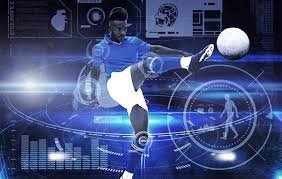Artificial Intelligence (AI) has become an integral part of various industries, and sports is no exception. From player performance analysis to injury prevention and fan engagement, AI is transforming the way athletes, coaches, and teams operate. In this blog, we will explore the impact of AI in sports, supported by case studies and real-world examples.

AI’s Role in Sports
AI enhances sports in multiple ways, including performance tracking, game strategy, injury prevention, and audience engagement. Below are some of the key areas where AI is making a significant impact:
1. Performance Analysis and Player Development
AI-powered tools analyze player movements, predict performance trends, and provide actionable insights. These insights help athletes and coaches fine-tune strategies for improved results.
Example:
- IBM Watson in Tennis: IBM’s AI system provides in-depth match analysis during major tennis tournaments, such as Wimbledon, helping players understand their strengths and weaknesses.
- Hudl and STATSports: These AI-driven platforms analyze game footage to provide performance insights for individual players and teams.
2. Game Strategy and Decision Making
AI assists coaches and teams by providing data-driven strategies. Machine learning algorithms analyze past games, player statistics, and opponent tactics to offer real-time recommendations.
Case Study:
Manchester City’s AI-Powered Analytics: The club uses AI and big data analytics to assess player performance, opposition weaknesses, and optimal game tactics.
Basketball AI (Second Spectrum): The NBA employs AI-powered tools like Second Spectrum to provide real-time data, which coaches use to adjust game strategies dynamically.
3. Injury Prevention and Player Health Monitoring
AI helps in predicting and preventing injuries by analyzing player movements, workload, and biomechanics. Wearable sensors collect data, which is then analyzed to detect early signs of fatigue or potential injuries.
Example:
Catapult Sports: This AI-based system monitors player movements and provides data to prevent overtraining and injuries.
Zebra Technologies in the NFL: The NFL uses RFID tracking to monitor player movements, helping teams optimize training and reduce injury risks.
4. Referee Assistance and Fair Play
AI plays a crucial role in ensuring fair play by assisting referees in making accurate decisions.
Example:
VAR (Video Assistant Referee) in Soccer: AI-driven VAR technology reviews controversial decisions in football, improving officiating accuracy.
Hawk-Eye Technology in Cricket and Tennis: This AI system accurately determines ball trajectories, aiding in decision-making.
5. Enhancing Fan Engagement and Experience
AI also enhances fan engagement by offering personalized content, virtual reality experiences, and real-time match analysis.
Case Study:
AI in Broadcasting (ESPN & Fox Sports): AI generates highlight reels, player statistics, and game predictions, enhancing the viewing experience.
Chatbots and Virtual Assistants: AI-powered chatbots provide real-time updates, ticket booking assistance, and match predictions for fans.
6. Upcoming AI Technologies in Sports
The future of AI in sports is promising, with emerging technologies set to redefine the industry. Some of the most exciting advancements include:
AI-Powered Smart Stadiums: AI-driven stadiums will enhance security, optimize crowd management, and provide immersive fan experiences.
AI-Driven Personalized Training Programs: Machine learning algorithms will create hyper-personalized training regimens based on an athlete’s unique biomechanics and performance data.
AI-Enhanced Virtual Coaching: Virtual coaches using AI and augmented reality (AR) will provide real-time feedback to athletes during training sessions.
Predictive Injury Models: AI will evolve to predict potential injuries even more accurately by analyzing genetic, biomechanical, and environmental factors.
AI-Based Recruitment and Scouting: AI will play a larger role in scouting talent by analyzing player statistics, skills, and potential in various leagues and academies.
Challenges and Limitations of AI in Sports
While AI is transforming sports, there are challenges, including:
- High Implementation Costs: AI systems require significant investment.
- Data Privacy Concerns: Collecting and analyzing athlete data raises ethical questions.
- Dependence on Technology: Over-reliance on AI may undermine human judgment in decision-making.
Conclusion: The Future of AI in Sports
AI is revolutionizing sports by enhancing performance, refining strategies, preventing injuries, and improving fan experiences. With continuous advancements, AI will become even more sophisticated, providing deeper insights and transforming the way sports are played and managed.
As technology evolves, how do you see AI shaping the future of sports? Share your thoughts in the comments!

